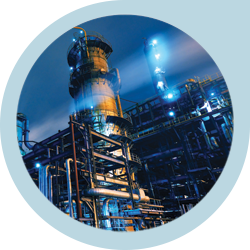
eFuels
eMethanol for Synthetic Fuels
CRI was the first company in the world to produce certified eMethanol
eFuels
eFuels are a class of synthetic fuels produced from renewable energy sources. Unlike traditional fossil fuels, eFuels are climate neutral as they do not release additional CO₂ during combustion, making them sustainable, alternative fuels to gasoline, kerosene and diesel for transport and heating.
Typically, eFuels are produced by processing electrolytic hydrogen made with electricity from renewable sources, water and carbon dioxide captured from industrial emissions or the atmosphere. Some examples of different eFuels include synthetic fuels from CO₂ such as:
e-gasoline
e-diesel
e-jet or e-kerosene
e-methane
e-DME/ e-OME
e-methanol
These eFuels are synthetic fuels from CO₂ and are distinguished by the pathway used to produce them. Some of these pathways can be explored in our graphic below.
Also known as “power-to-X” products (PtX), eFuels, such as eMethanol, offer significant opportunities for the decarbonisation of the global economy. eMethanol’s inherent stability allows it to be stored at room temperature and ambient pressure, giving it an indefinite shelf life. Its compatibility with existing infrastructure and technologies across various sectors makes it a “drop-in fuel” with a low transition cost. As eFuels are also energy-dense and easy to transport, they are one of the most promising solutions for reducing greenhouse gas emissions compared to other proposed alternatives.
The number of alternative fuel marine vessels ordered in 2023.
Methanol vessel orders grew 400% year on year.
Key Markets for eMethanol as a Sustainable Fuel
Renewable methanol is gaining traction as a sustainable efuel. CRI is leading the way, with projects across diverse sectors, from marine to road transport, motor sports and renewable energy project development.
CRI first to deliver emethanol for marine
eFuels: Decarbonisation of Marine
The maritime sector is integral to global trade but is a significant contributor to greenhouse gas emissions. The International Maritime Organization (IMO) has set ambitious goals to reduce CO2 emissions by 50% by 2050*.
*Source: International Maritime Organization
eFuels, such as eMethanol, provide a pathway to meet these targets without investing in new infrastructure or ship engines. According to a survey of 200 maritime decision-makers, 97% are convinced that eFuels will become essential by 2050. The survey also reports that 41% are looking for strategic partnerships with eFuel providers and 36% are planning a technical retrofit of their ships, indicating significant real growth and potential for eFuels in the maritime industry*.
*Source: moweb and Accelleron ‘E-Fuels in the Shipping Industry’ survey
CRI has been operating road vehicles on emethanol since 2016
eFuels: Transition of Conventional Vehicles
There are approximately 1.4 billion internal combustion engines in the world*, connected by a vast, established supply chain infrastructure. eFuels, like eMethanol, can be used in today's internal combustion engine vehicles and transported via the existing infrastructure and logistic system. As eFuels can replace fossil fuels more quickly and at a lower transition cost than other options, it offers a viable route to decarbonise the road transport industry.
*Source: eFuel Alliance
eFuels: Sustainable Aviation Fuel (SAF)
As direct electrification and the use of pure, renewable, hydrogen-powered turbines are considered not feasible in the mid-term, eKerosene, produced from eMethanol, is likely to become the main pathway for SAF production in the medium-to-long term. It is one of the most practical choices for decarbonising the aviation sector, as it is compatible with existing infrastructure and aircraft engines and offers a high energy density. The methanol-to-jet process, in particular, is more selective and efficient for producing SAF compared to other routes, with ASTM approval expected to be imminent.
eFuels: Renewable Energy Storage & Transportation
Renewable energy is often produced far from where it can be used, and its production is not always steady over time. eFuels, being high energy density and capable of long-term, low-cost storage, add significant value to renewable energy projects. By converting renewable energy into eFuels, energy can be stored and transported efficiently using existing infrastructure, addressing the challenges of variability and the mismatch between renewable energy production and consumption.
eMethanol
CRI was the first company in the world to make certified eMethanol for sale as an eFuel. As the demand for eFuels continues to grow across various industries, there are significant opportunities for energy project developers to include eFuel production in their portfolios. Carbon dioxide emitters can also find new value-added applications for this waste stream, which can be converted into methanol - a valuable fuel or building block for other fuels and chemicals.
eMethanol pathways to fuels
P1 FUELS AND CARBON RECYCLING INTERNATIONAL (CRI) SIGN CONTRACT TO DELIVER E-FUEL PRODUCTION UNIT TO GERMANY
P1 Fuels has signed a contract with CRI, a global leader in clean methanol technology, for delivery of an e-methanol production unit. The collaboration focuses on integrating CRI's innovative Emissions-to-Liquids (ETL) technology with P1's proprietary methanol to gasoline technology to produce low cost e-fuels that can be used in cars without engine modification.
CRI Services
Project Feasibility & Conceptual Studies
ETL Technology
Project Technical Services
Lifetime Services
eFuel Projects
Low-emission efuels are gaining widespread policy recognition as a decarbonisation solution, especially in the aviation and marine sectors, while China leads in methanol for road vehicles.
The number of announced eFuel projects worldwide is growing, especially in Europe, driven by mandates such as for the use of low-emission fuels in aviation and emissions standards in shipping.
-

CO2 Emission Sources
-

Chemical Producers and Consumers
-

eFuels Producers and Consumers
-

Renewable Energy and Hydrogen Project Developers
Work with us
CO₂ Recycling | Renewable Energy Use | Renewable Methanol Production
proven at scale, with plants over 100,000 tonnes/year
technology with the best efficiency and flexibility for CO₂ recycling
expertise to realise projects









